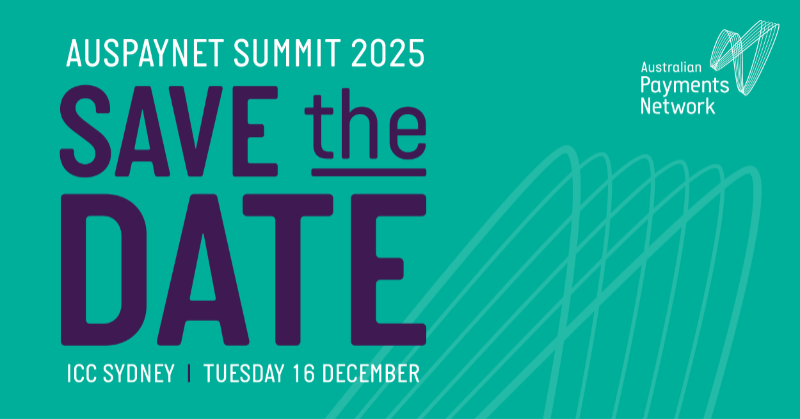
In this Issue
-
CEO's corner by Andy White
-
Payments reforms
-
Cross-border payments
-
Economic crime
-
Stakeholder engagement
-
AusPayNet events
-
New members
CEO’s corner
The Election and its Implications for Payments
For its second term, the Albanese Government’s main focus will be on cost-of-living pressures, housing affordability, trade wars and other geopolitical risks. Payment reforms and infrastructure modernisation initiatives will inevitably continue to be a middle shelf priority for them compared to those big picture themes.
That said, we would hope to see the amendments to the Payment Systems (Regulation) Act gain traction on the legislative agenda, given they just failed to make the cut pre-election. These are important in (a) expanding the RBA’s regulatory perimeter to capture the entirety of the payments ecosystem, including payment services such as Buy Now, Pay Later and digital wallets, and (b) in providing a foundational step for payments licensing. On the latter, we would still expect an exposure draft of the first tranche of payments licensing before the end of the year, with a second tranche (including standard-setting and common access requirements) thereafter.
We would also hope that – despite Stephen Jones’ retirement and the resulting need for a new Assistant Treasurer – momentum will be maintained on the Scams Prevention Framework’s regulatory codes, applying to financial institutions but also telcos and digital platforms. This remains critical, since while scam losses in Australia have fallen 36 per cent in the last two years, regulation should drive further reductions and therefore ameliorate the impact of these economic crimes, which still affect far too many Australians.
Finally, we do not anticipate any impact on our transformation programs, all of which are backed by Government’s Strategic Plan for Australia’s Payments System (Strategic Plan), itself due for a refresh post-election:
- The timings for the Cheques Transition Plan are now set (by 30 June 2028 for issuance and on 30 September 2029 for acceptance), and AusPayNet has interim authorisation from the ACCC to manage the orderly wind-down of the cheques system.
- The RBA’s Risk Assessment on the decommissioning of BECS helpfully lays out the next steps and, similarly, AusPayNet (this time, together with AP+) has interim authorisation from the ACCC to manage this process.
- The focus on cybersecurity and resilience will continue to increase, emphasising the importance of AusPayNet’s AES Migration Program.
Learnings from the UK
It was my pleasure recently to spend a week in the UK, where I spoke at Pay360 (Europe’s largest payments event), the Global Anti-Scam Summit – the largest economic crime event held globally to date – and the BIS Innovation Hub’s Analytics Challenge.
As always, I learned a lot. On economic crime, there was a strong view that economic crime should be seen as a national security issue, in order to drive real government action. As an example, the question was raised as to why governments aren’t acting to halt the existence of scam compounds (where their location is known), to truly stop scams at their source. Counter-terrorism and cyber were used as analogies, both in terms of the need for a government-sponsored national centre (like Australia’s National Anti-Scam Centre) and the need for government to immediately share intelligence on economic crime in the same way they do for terrorist and cyber-attacks.
There was strong interest in the Australian approach on scams, given the reduction in scam losses here, and the perceived failings of the UK reimbursement scheme. Similarly, there was strong interest in Australia’s Strategic Plan – given the UK is currently building out how it will deliver against its National Payments Vision – and, in part because of this, our transformation initiatives around Cheques, BECS and AES.
Standards, and a new Framework
Notwithstanding the timing for the second tranche of payments licensing noted above, including authorisation of any standard-setting bodies, AusPayNet’s work in the standards space continues. On 1 May, our Board approved the new Standard for Payment Service Provider Porting of Merchant Payment-Related Data, on which we previously consulted. Separately, work is now underway to convert the ATM Access Code into an ATM Access Standard. Both pieces of work – and our work on the rest of our standards pipeline – will provide vital test cases on our journey to becoming an Authorised Standards-Setting Body.
Alongside these standards, we now have our first new framework since 2015: on 21 March, AusPayNet launched the e-Conveyancing Payments Industry Code, which regulates financial settlement in e-Conveyancing, enhancing its security, standardisation and efficiency. The Code has been developed through collaboration between AusPayNet, the e-Conveyancing industry, financial institutions and other stakeholders, and I would like to thank them for working so closely with us to ensure the Code meets the needs of the various stakeholders involved and supports the growth and evolution of e-Conveyancing in Australia. For more information, please visit our
e-Conveyancing payments webpage.
For the latest update on our BECS Transition Program, please visit our dedicated project page.
Payments reforms
Consultation on mandating cash acceptance
In February, AusPayNet responded to Treasury’s consultation on a proposed mandate for certain businesses supplying essential goods and services to accept cash as a payment method.
AusPayNet's submission welcomed the Government’s commitment to ensuring that cash remains a viable means of payment for individuals in our society who want or need to use it. In this context, we acknowledged the Government’s concerns about the negative implications that could arise if an increasing number of businesses chose to no longer accept cash in the future. We understand that the cash acceptance mandate has been proposed as a proactive step to protect cash acceptance while it remains widespread, avoiding potentially higher costs of intervention in the future if infrastructure needs to be rebuilt.
At the same time, we highlighted that the effectiveness of such a mandate — or any alternative policy options to achieve the intended policy outcomes — would depend crucially on several factors. Our submission explained that:
- The effectiveness of a cash acceptance mandate will be critically dependent on the ongoing provision of reliable and efficient cash access and distribution infrastructure for both consumers and businesses.
- While the small business exemption would help protect smaller merchants from disproportionate costs, it may have unintended consequences for competition and the certainty of cash acceptance in some communities, undermining the policy objectives.
- There are limitations to relying on cash as a means of safeguarding payments system resilience during technology outages or natural disaster events, so broader work to enhance payments system resilience remains essential.
- The definition and scope of 'essential’ goods and services requires further consideration and clarification, particularly for businesses that sell both essential and non-essential items.
- A mandate would need to include appropriate provisions and flexibility to address any potential security risks and operational challenges, including through value- and time-based limits on cash acceptance requirements.
- The effectiveness of a mandate will also depend on robust monitoring and enforcement mechanisms, and the flexibility to review and adapt the framework over time to ensure it remains fit-for-purpose.
Cross-border payments
The Financial Stability Board (FSB) continues with its Work Programme for 2025. While more than half the actions under the FSB’s Roadmap have been completed, there is still significant work to be done to achieve the Roadmap’s goals of faster, cheaper, more transparent and more inclusive cross-border payments. The FSB will reframe its strategy to focus on identifying and addressing the challenges to implementing the Roadmap actions, and it will strengthen its engagement with the private sector.
Industry taskforces
CPMI’s Payments Interoperability and Extension (PIE) Taskforce published a webinar on its task teams’ work and planned deliverables in 2025. The most recent meeting of the PIE Taskforce (in January 2025) was the final meeting to be held with the current member composition. CPMI is seeking to renew the PIE Taskforce by inviting market stakeholders to join.
The FSB has not published any summary or action points of its Legal, Regulatory and Supervisory (LRS) Taskforce since April 2024. However, the FSB published two relevant papers in December, discussed more broadly in our Cross-Border Payments Round-up – March 2025, along with several other developments in cross-border payments.
Interlinking fast payment systems
For many years, the Bank for International Settlements’ Singapore Innovation Hub has been working on Project Nexus. Project Nexus is designed to standardise the way that domestic fast payment systems (FPS) connect internationally, to improve the speed, cost and transparency of cross-border payments. To implement the vision of Project Nexus, Nexus Global Payments was recently established, marking a new beginning in scaling the delivery of cross-border interlinked domestic FPS, as these systems are only required to connect once to Nexus to gain access to all other countries in the network.
Economic crime
We welcome the findings of the National Anti-Scam Centre’s (NASC’s) annual Targeting Scams report, specifically concerning the continued reduction in scam losses and reports. According to the NASC’s report, scam losses fell by a further 26 per cent in 2024, after falling 13 per cent in 2023, indicating the Australian ecosystem effort model is working. Our CEO, Andy White, continues to represent AusPayNet on the NASC Advisory Board.
Following the recent passage through Parliament and commencement of the Scams Prevention Framework Act 2025, we stand ready to work with ASIC and the ACCC to develop the supporting codes and rules.
Economic Crime Forum (ECF)
The latest ECF was held in Melbourne on 25 February, coinciding with the national law enforcement meetings. The ECF agreed to develop two workgroups to:
- Develop a national week of action targeting money mules
- Clarify and determine the pathways for financial institutions to dispose of suspected proceeds of crime when mule accounts are closed or blocked.
On 2 April, the post-ECF briefing was provided to electing members, with over 100 participants. The briefing attracted strong participation and support for the two ECF workgroups.
Global Anti-Scam Alliance
AusPayNet has joined the Global Anti-Scam Alliance (GASA) as a Supporting Member. Head of Economic Crime, Toby Evans, represents AusPayNet on the Oceania Chapter Board, which is looking at the impact of scam compounds and what is required to mitigate this growing threat. Scams are a global problem requiring a global response. By joining GASA, AusPayNet strengthens its international collaboration to combat scams and fraud. Together with our growing network of partners, we look forward to sharing insights, advancing best practices, and building greater resilience against scams across the digital economy.
Stakeholder engagement
Our Stakeholder Advisory Council had its first meeting for 2025 in February. At this meeting, we welcomed Cathie Armour, AusPayNet Independent Director, as the new Chair. Further, we sought the Council’s feedback and perspectives on:
- Our payment policy priorities (the Scams Prevention Framework, the RBA Review, Treasury’s proposal to mandate cash acceptance, and the proposed PSP licensing regime)
- Our leadership to coordinate the wind-down of the cheques system
- Our work on the transition away from the BECS Framework
- The review of the Card-Not-Present (CNP) Fraud Mitigation Framework
- The Standard for Payment Service Provider Porting of Merchant Payment-Related Data.
AusPayNet events
Save the date: Summit 2025
This year’s AusPayNet Summit will be held at the International Convention Centre, Sydney on Tuesday, 16 December. We look forward to updating you on our showpiece event in future editions of Payments Monitor.
Brisbane event
Our inaugural Brisbane Member event was held at Suncorp’s offices on 25 February. We had 46 Member representatives attend two sessions (an update on the payments strategic plan and regulatory reforms; and a panel discussion on challenges and opportunities of the BECS Transition), followed by networking drinks. Both this, and last year’s Melbourne Member event have proved popular, and as a result, we will look to continue our interstate events.
 |
 |
AES Migration Webinar
On 7 May, we held a Member Insights webinar on the AES Migration Program. The webinar presented the case for change, federal agency positions and industry’s approach to collaboration on this essential program. This was the first of a series of AES Migration webinars planned for 2025, with future topics to include the Technical Blueprint, Migration Strategy and Industry Testing Strategy. To find out more about our work on the AES Migration Program, visit our dedicated project page.
New members
AusPayNet is pleased to welcome BNK Banking Corporation Ltd as a BECS Tier 2 Member (effective 31 March 2025).
For more information on AusPayNet membership, please visit our website.



